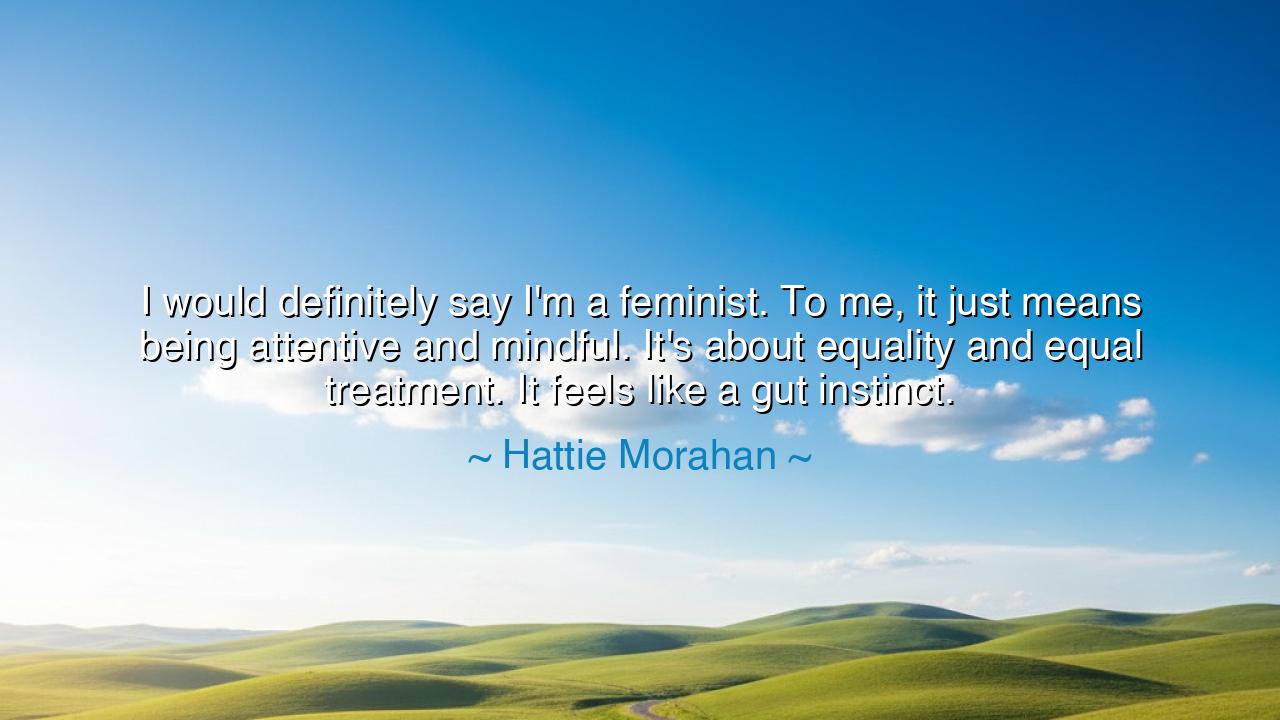
I would definitely say I'm a feminist. To me, it just means being
I would definitely say I'm a feminist. To me, it just means being attentive and mindful. It's about equality and equal treatment. It feels like a gut instinct.






When Hattie Morahan said, “I would definitely say I'm a feminist. To me, it just means being attentive and mindful. It's about equality and equal treatment. It feels like a gut instinct,” she spoke with the simplicity of truth — a truth not born from theory or defiance, but from the quiet conscience of the human spirit. Her words strip away the noise that so often surrounds the word feminism, revealing its essence: attentiveness, mindfulness, and equality. She does not speak as a warrior shouting in the public square, but as a seer of the heart, reminding us that justice begins not in law or protest, but in awareness — in the instinctive knowing that fairness is the rhythm of the soul.
The origin of this quote comes from Morahan’s reflections as a modern artist and actress who has portrayed complex women in film and theatre. In interviews, she often speaks of feminism not as a movement of division, but as a call to perception — a way of seeing clearly where imbalance still lingers. Her words are born not from academic discourse, but from lived empathy: the understanding that to be “attentive and mindful” means to notice when one voice is silenced, when one person’s labor is undervalued, or when one gender’s freedom is assumed while the other’s must be earned. In her view, feminism is not an ideology imposed upon the world, but a natural instinct — the moral intuition that equality is the rightful order of things.
The ancients, too, spoke of such instincts — the inner compass that guides the just and the wise. Socrates called it his daimonion, the inner voice that warned him when he strayed from truth. So too does Morahan describe feminism as a gut instinct, a stirring from within that tells the soul what is right. For in every age, the truest revolutions are not born from hatred, but from conscience. When a person looks upon the world with mindfulness, they see that injustice is not a single event, but a pattern woven into daily life — and to break that pattern requires both courage and compassion.
Consider the life of Emmeline Pankhurst, the English suffragette who led women to fight for the right to vote in the early 20th century. To many of her contemporaries, her activism seemed radical, even violent. Yet beneath her defiance was the same mindfulness that Morahan describes — the awareness that inequality is not natural, but learned, and that silence is complicity. Pankhurst’s courage was the outward expression of an inner instinct that had long whispered in women’s hearts: that they, too, were meant to stand upright beneath the sun, as free and dignified beings. Her struggle was the awakening of that instinct in a society that had forgotten its moral sight.
Morahan’s words also remind us that equality is not a battle between genders, but a balance between souls. To be attentive is to listen — not only to the oppressed, but also to the oppressor who has forgotten how to see others as equals. To be mindful is to recognize that liberation cannot come through dominance, but through restoration — through the remembrance that men and women, in their shared humanity, are reflections of the same light. In this way, her feminism is not an act of rebellion, but of healing; not a rejection of tradition, but a return to harmony.
What makes her declaration so powerful is its gentleness. In an age where anger often drowns understanding, Morahan reminds us that true awareness begins in empathy. To practice feminism as attentiveness means to look at the world with open eyes — to notice when opportunity favors one and not another, to speak when silence protects the unjust, and to act with the quiet conviction that fairness is not optional but sacred. It is to live daily with the humility to learn, and the courage to care.
Let this be the lesson carried forward: equality is the natural law of the soul, and to live without it is to live against the grain of human dignity. Every man and woman who walks this earth must cultivate the same attentiveness that Morahan describes — to watch, to listen, to feel when something is out of balance, and to act with kindness and clarity to restore it. For mindfulness is the beginning of justice, and justice is the flowering of love. Thus, the wise will remember that feminism, in its truest form, is not merely a movement, but a moral instinct — the heartbeat of fairness itself, echoing through all who have the courage to listen.






AAdministratorAdministrator
Welcome, honored guests. Please leave a comment, we will respond soon